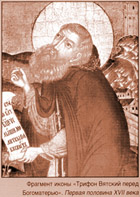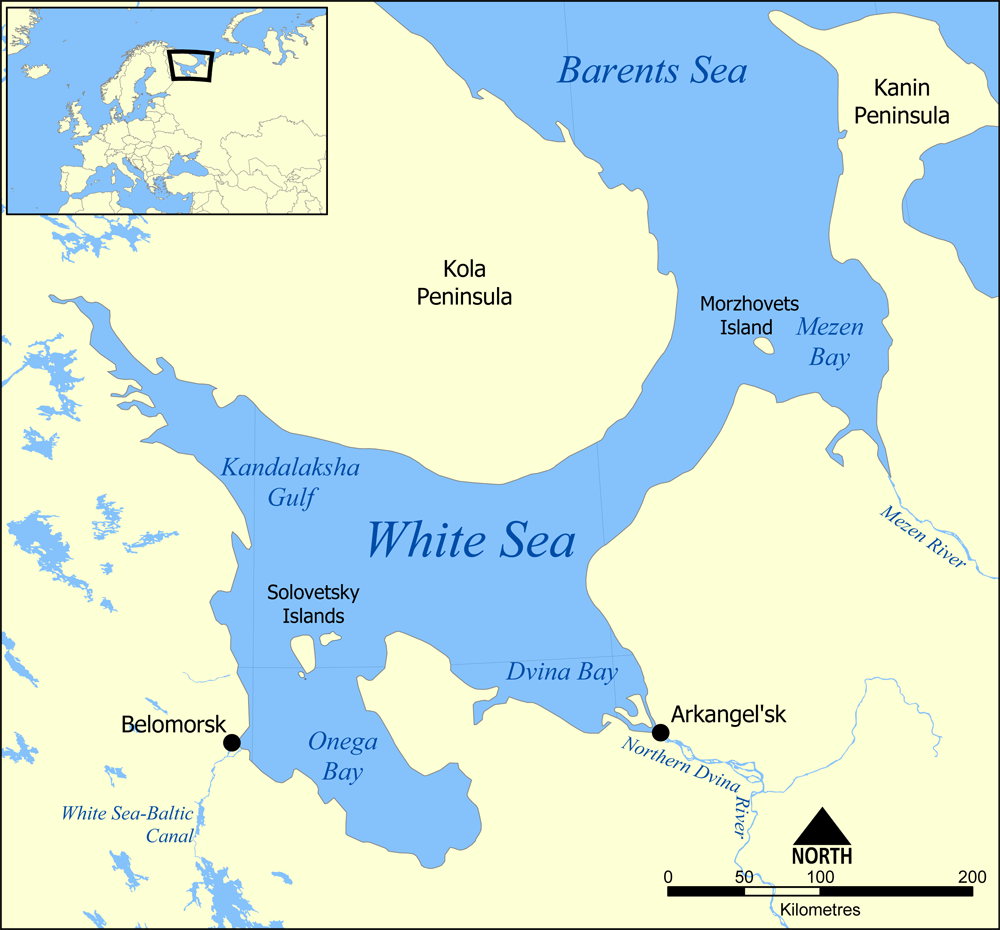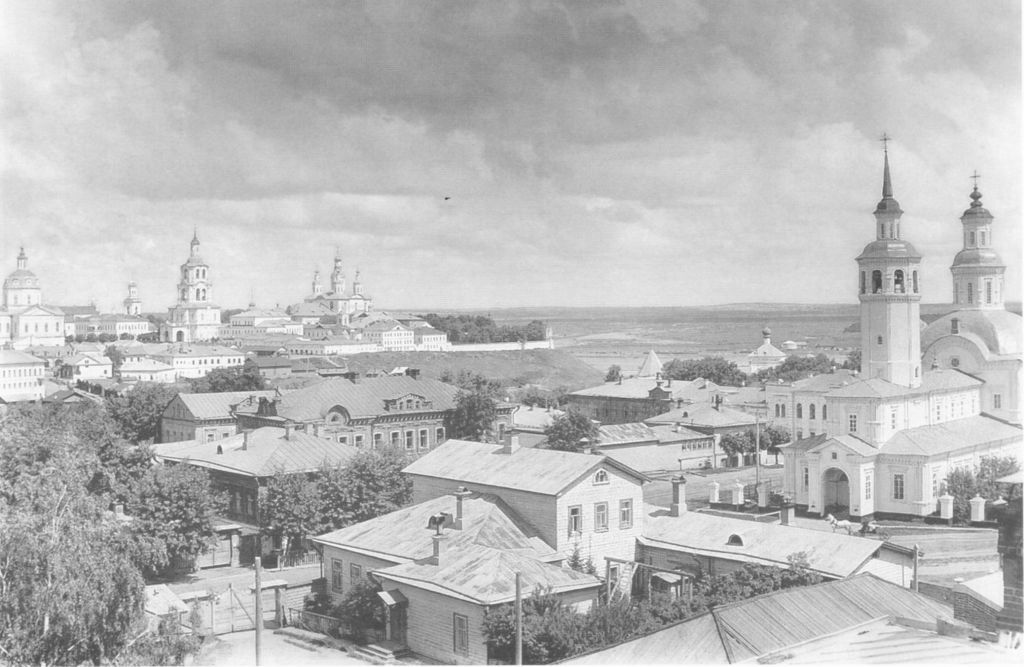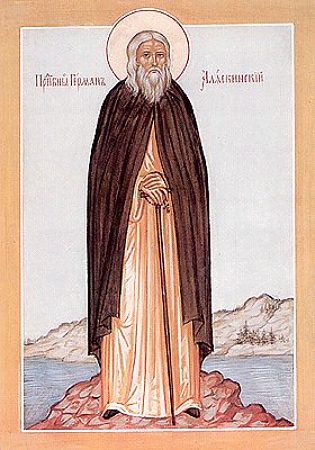|
Tryphon Of Vyatka
Tryphon of Vyatka (c. 1546–1612) was a Russian abbot and saint. Tryphon was born in the village of Malaya Nemnyuzhka (Malaya Nemnyuga or Malonemnyuzhskoye (Voskresenskoye)) of Pinezhsky district (now the village Sovpolye, Mezensky District, Arkhangelsk Oblast), in the family of a wealthy peasant Dimitry Podvizev. He is known for evangelizing to the Ostyak Ostyak (russian: Остя́к) is a name formerly used to refer to several indigenous peoples and languages in Siberia, Russia. Both the Khanty people and the Ket people were formerly called Ostyaks, whereas the Selkup people were referred to as ...s, and founded a monastery in Vyatka. He was canonized by the Russian Orthodox Church in 1903, his feast day is October 12. Russian saints People from Vyatka Governorate 1540s births 1612 deaths {{saint-stub ... [...More Info...] [...Related Items...] OR: [Wikipedia] [Google] [Baidu] |
Trifon Vyatka
Trifon or Trifón (russian: Трифон, link=no) is a given name derived from Greek Τρύφων, Tryphon literally meaning "one who lives in luxury". An archaic transliteration from Greek is Trufon. It is used by Russians and other peoples of East Orthodox denomination. In Finnic languages, a variant is ''Triihpo'', appeared as a result of an ''f'' → ''hp'' change. Another variant of the word is ''Ruippo'', a surname which was used in Southern Karelia and Eastern Savo before World War II. Notable people with the name include: Given name * Metropolitan Trifon (1861–1934), hierarch of the Russian Orthodox Church * Trifon Datsinski (born 1953), Bulgarian equestrian * Trifón Gómez (1889–1955), Spanish politician * Trifon Ivanov (1965–2016), Bulgarian football player * Trifon Korobeynikov (16th-century), Moscow merchant and traveller * Trifon Shevaldin (1888–1954), Soviet military officer See also * *Tryphon (other) *Saint Tryphon (other) Saint Try ... [...More Info...] [...Related Items...] OR: [Wikipedia] [Google] [Baidu] |
Sovpolye
Sovpolye (russian: Совполье) is a rural locality (a village) in Sovpolskoye Rural Settlement of Mezensky District, Arkhangelsk Oblast Arkhangelsk Oblast (russian: Арха́нгельская о́бласть, ''Arkhangelskaya oblast'') is a federal subjects of Russia, federal subject of Russia (an oblast). It includes the Arctic Ocean, Arctic archipelagos of Franz Josef Land ..., Russia. The population was 38 as of 2010. There are 4 streets. Geography Sovpolye is located on the Sova River, 96 km southwest of Mezen (the district's administrative centre) by road. Chizhgora is the nearest rural locality. References Rural localities in Mezensky District {{ArkhangelskOblast-geo-stub ... [...More Info...] [...Related Items...] OR: [Wikipedia] [Google] [Baidu] |
Mezensky District
Mezensky District (russian: Мезе́нский райо́н) is an administrative district (raion), one of the twenty-one in Arkhangelsk Oblast, Russia.Law #65-5-OZ As a municipal division, it is incorporated as Mezensky Municipal District.Law #258-vneoch.-OZ It is located in the northeast of the oblast and borders with Nenets Autonomous Okrug in the northeast, Ust-Tsilemsky District of the Komi Republic in the east, Leshukonsky and Pinezhsky Districts in the south, and with Primorsky District in the southwest. From the north, the district borders the White Sea. The area of the district is . Its administrative center is the town of Mezen. Population: The population of Mezen accounts for 34.6% of the total district's population. History The area was originally populated by speakers of Uralic languages and then colonized by the Novgorod Republic. After the fall of Novgorod, the area became a part of the Grand Duchy of Moscow. Komi started moving to the Mezen in the 14th and 15 ... [...More Info...] [...Related Items...] OR: [Wikipedia] [Google] [Baidu] |
Arkhangelsk Oblast
Arkhangelsk Oblast (russian: Арха́нгельская о́бласть, ''Arkhangelskaya oblast'') is a federal subjects of Russia, federal subject of Russia (an oblast). It includes the Arctic Ocean, Arctic archipelagos of Franz Josef Land and Novaya Zemlya, as well as the Solovetsky Islands in the White Sea. Arkhangelsk Oblast also has administrative jurisdiction over the Nenets Autonomous Okrug (NAO). Including the NAO, Arkhangelsk Oblast has an area of 587,400 km2. Its population (including the NAO) was 1,227,626 as of the Russian Census (2010), 2010 Census. The classification of inhabited localities in Russia, city of Arkhangelsk, with a population of 301,199 as of the 2021 Census, is the administrative center of the oblast.Charter, Article 5 The second largest city is the nearby Severodvinsk, home to Sevmash, a major shipyard for the Russian Navy. Among the oldest populated places of the oblast are Kholmogory, Arkhangelsk Oblast, Kholmogory, Kargopol, and S ... [...More Info...] [...Related Items...] OR: [Wikipedia] [Google] [Baidu] |
Ostyak
Ostyak (russian: Остя́к) is a name formerly used to refer to several indigenous peoples and languages in Siberia, Russia. Both the Khanty people and the Ket people were formerly called Ostyaks, whereas the Selkup people were referred to as Ostyak-Samoyed. Khanty The Khanty people, who also call themselves ''Khanti'', ''Khande'', or ''Kantek'' were known to the Russians as ''Yugra'' in the eleventh century, with the name ''Ostyak'' first appearing in the sixteenth century. The Soviet Union began using the endonym ''Khant'' or ''Khanty'' during the 1930s. some 28,000 people identify as Khanty, primarily in Tyumen Oblast, which includes the Khanty–Mansi Autonomous Okrug. The Khanty language, also known as Hanty, Khant, Xanty, or Ostyak, is a Uralic language with about 9,500 native speakers. Ket The Kets historically lived near the Yenisei River in the Krasnoyarsk Krai district of Russia. The Imperial Russians originally called them ''Ostyak'', and later ''Yenisei Ost ... [...More Info...] [...Related Items...] OR: [Wikipedia] [Google] [Baidu] |
Kirov, Kirov Oblast
Kirov ( rus, Ки́ров, p=ˈkʲirəf, a=Ru-Киров.ogg) is the largest city and administrative center of Kirov Oblast, Russia. It is located on the Vyatka River in European Russia, 896 km northeast of Moscow. Its population was 518,348 in 2020. Kirov is a historical, cultural, industrial, and scientific center of Priural'e (territory on the west side of the Ural Mountains); place of origin for Dymkovo toys; the most eastern city founded during the times of Kievan Rus'. The city also had the names of Khlynov (, from 1457 to 1780), and Vyatka (, until 1934). History Principality and republic The native Slavic tribe of Central Russia and Volga regions, the Vyatichis (also called Viatichi), mixed here with the Novgorod Slavs, Novgorodian Slovenes and Finno-Ugric languages, Finno-Ugric people. According to the medieval chronicles the first Russian settlements in the area appeared in 12th century. Kirov itself was first mentioned (as Vyatka) for the first time i ... [...More Info...] [...Related Items...] OR: [Wikipedia] [Google] [Baidu] |
Russian Saints
This list of Russian saints includes the saints canonized by the Russian Orthodox Church and the Russian saints canonized by other Eastern Orthodox Churches. Saints are sorted by their first names. See also the category :Russian saints. A more complete list of saints: *List of Russian saints (until 15th century) * List of Russian saints (since 15th century) Alphabetical list __NOTOC__ A * Abraham and Coprius of Gryazovets (XV century), founders of the monastery in Gryazovets * Abraham and Onesimus of Kiev Caves, 12th- and 13th-century monks from the Kiev Pechersk Lavra * Abraham of Bulgaria (d. 1229), Muslim-born convert from Volga Bulgaria, killed for his conversion, martyr * Abraham of Galich, hegumen, founder of four monasteries on Lake Chukhloma in Kostroma Oblast * Abraham of Mirozha, a 12th-century abbot of the Mirozhsky Monastery at Pskov * Abraham of Rostov, founder of the Abraham Epiphany Monastery in Rostov * Abraham of Smolensk, 12th-century monk and icon-paint ... [...More Info...] [...Related Items...] OR: [Wikipedia] [Google] [Baidu] |
People From Vyatka Governorate
A person ( : people) is a being that has certain capacities or attributes such as reason, morality, consciousness or self-consciousness, and being a part of a culturally established form of social relations such as kinship, ownership of property, or legal responsibility. The defining features of personhood and, consequently, what makes a person count as a person, differ widely among cultures and contexts. In addition to the question of personhood, of what makes a being count as a person to begin with, there are further questions about personal identity and self: both about what makes any particular person that particular person instead of another, and about what makes a person at one time the same person as they were or will be at another time despite any intervening changes. The plural form "people" is often used to refer to an entire nation or ethnic group (as in "a people"), and this was the original meaning of the word; it subsequently acquired its use as a plural form of per ... [...More Info...] [...Related Items...] OR: [Wikipedia] [Google] [Baidu] |
1540s Births
Year 154 ( CLIV) was a common year starting on Monday (link will display the full calendar) of the Julian calendar. At the time, it was known as the Year of the Consulship of Aurelius and Lateranus (or, less frequently, year 907 ''Ab urbe condita''). The denomination 154 for this year has been used since the early medieval period, when the Anno Domini calendar era became the prevalent method in Europe for naming years. Events By place Roman Empire * King Eupator of Bosphorus pays tribute to Rome, due to the threat posed by the Alani. * The Antonine Wall is completed. Asia * Last (2nd) year of ''Yongxing'' era of the Chinese Han Dynasty. * Adalla becomes ruler of the Korean kingdom of Silla. By topic Religion * Anicetus becomes pope of Rome (approximate date). * Anicetus meets with Polycarp of Smyrna to discuss the Computus, the date of Easter in the Christian liturgical calendar. * Change of Patriarch of Constantinople from Patriarch Euzois to Patriarch La ... [...More Info...] [...Related Items...] OR: [Wikipedia] [Google] [Baidu] |


.jpg)


_1938.jpg)